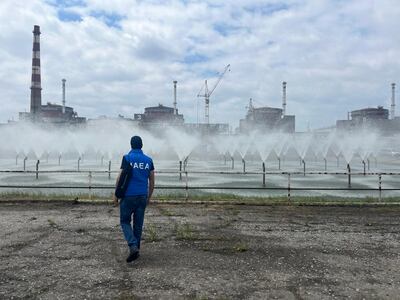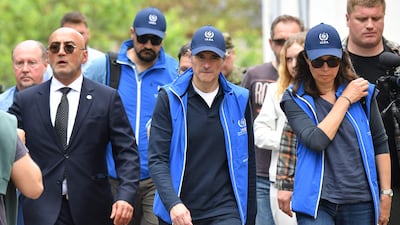The head of the UN atomic energy agency said on Thursday that ensuring water for cooling was a priority of his visit to the Russian-controlled Zaporizhzhia nuclear plant in Ukraine.
He added that the station could operate safely for “some time”.
Rafael Grossi of the International Atomic Energy Agency was inspecting the state of Europe's largest nuclear plant following last week's breach of the Kakhovka dam, downstream on the Dnipro River.
“What is essential for the safety of this plant is that the water that you see behind me stays at that level,” Mr Grossi said in two tweets issued from near the station, including next to a pond that supplies water for cooling.
“With the water that is here, the plant can be kept safe for some time. The plant is going to be working to replenish the water so that safety functions can continue normally.”
Mr Grossi said the visit, his third to the plant in southern Ukraine since Russian forces occupied it in the first days of the February 2022 invasion, had gathered “a good amount of information for an assessment”.
Russia and Ukraine have repeatedly accused each other of shelling near the plant, endangering its safe operation. The station's six reactors are now shut down.
An IAEA spokesman said that gunfire briefly halted Mr Grossi's convoy as it headed back to Ukrainian-held territory following the visit, but the delegation was in no immediate danger.
A Russian energy industry official was earlier cited by Tass news agency as accusing Ukraine of opening fire on the convoy.
Earlier in the day, Mr Grossi said it was unrealistic to expect Moscow and Kyiv to sign a document on the site's security while fighting raged nearby.

The Kakhovka reservoir was normally used to refill the cooling pond adjacent to the plant, but cannot do so now because of its falling water level following the breach, officials say.
Instead, the pond, which is separated from the reservoir, can be replenished using deep underground wells, they say.
Mr Grossi was earlier quoted by Russian news agencies as saying the situation at the site was “serious” but that the level of cooling water was sufficient.
He also said that IAEA inspectors would remain at the site.
“We have a political agreement which was formulated at the [UN] Security Council. Reaching a written agreement would be unrealistic at this stage because, as we know, there are no peace or ceasefire negotiations between the parties,” Tass quoted Mr Grossi as saying.
Mr Grossi's trip was delayed by a day for security reasons amid heavy fighting.
Russian forces captured both the nuclear plant and the Kakhovka hydroelectric dam shortly after President Vladimir Putin sent them into Ukraine on February 24 of last year.
The IAEA chief has repeatedly called for an end to fighting in the vicinity of the facility to avoid any catastrophic accidents.


